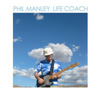 This solo debut initially had me pretty baffled, as it is stylistically all over the map and bears little resemblance to Manley's previous work with Trans Am and The Fucking Champs.  There is a perfectly logical explanation, however, as Life Coach is intended as a homage to the work of legendary German producer Connie Plank.  Of course, the fact that Phil is essentially attempting to pay tribute to the entire krautrock canon on a single album is probably even more baffling still (as well as inherently doomed), but he has the instrumental and engineering prowess to at least make an intermittently impressive show of it.
This solo debut initially had me pretty baffled, as it is stylistically all over the map and bears little resemblance to Manley's previous work with Trans Am and The Fucking Champs.  There is a perfectly logical explanation, however, as Life Coach is intended as a homage to the work of legendary German producer Connie Plank.  Of course, the fact that Phil is essentially attempting to pay tribute to the entire krautrock canon on a single album is probably even more baffling still (as well as inherently doomed), but he has the instrumental and engineering prowess to at least make an intermittently impressive show of it.
The element of Plank's work that most fascinates Manley is his attention to Klangfarben, which translates directly as "tone color," but more specifically means the nuances that give a tone its individuality.  For example, the same chord played on one guitar through one amp will sound different than the same chord played through another configuration.  As such, a lot of Phil's effort went into finding the right gear and recording equipment for getting exactly the clear, vintage sounds he wanted with as little interference from amplification and processing as possible.  In fact, it seems like maybe a bit too much effort may have been spent in search of the perfect timbres and textures, as the actual songs (while pleasant) aren't always substantial enough to make much of an impact.  People who get excited about great production or analog synthesizers will find a lot to be thrilled about, but the opportunities for delight are a bit more limited for those of us who don't care whether he used a Crumar Orchestrator or not.
The album's shortcomings are especially frustrating because Phil gets so much right: Life Coach is lively, melodic, and well arranged and he nails all of the key krautrock tropes without fail.  Unfortunately, not everything from that period has aged particularly well and Manley has a tendency towards brevity and simplicity that prevents many of his songs from effectively taking hold.  Also, there is one song ("Gay Bathers") that is just genuinely dreadful–while mercifully brief, it bears a very unfortunate resemblance to the "uplifting" closing credit music on Intervention.
Nevertheless, there are some notable successes too.  The album's definite highlight (and longest piece) is "Night Visions," a slowly unfolding and looping guitar piece that shares a lot of common ground with the excellent solo work of Emerald's Mark McGuire (no surprise, as they no doubt share many of the same influences).  There are some important differences though, as Manley's take on that sort of thing is much more minimal and meticulous than McGuire's and relies much less on escalating density. Some of the other highlights are the languid synth bliss of "Forest Opening Theme" and the odd "Commercial Potential,"which somehow seems to make '60s-style instrumental rock sound brooding and cinematic.  Many of the other pieces have their appealing traits as well, but suffer from over-brevity, underdevelopment, or simply lack of strong character.  Also, the opening "FT2 Theme" shows that the line separating "anthemic Neu! pastiche" from "music that could be from a mid-'80s aerobics video" is a very blurry and subjective one.
Life Coach has some moments of inspiration and a few good songs, but I would have liked it a lot more if Manley had been less conspicuously chameleonic. Acknowledging influences is certainly laudable and this album arguably works fairly well as a tribute/experiment (and a rather ambitious one at that), yet I am ultimately left with the feeling that I still have no idea what Phil Manley trying to sound like Phil Manley might sound like.
 
Read More


